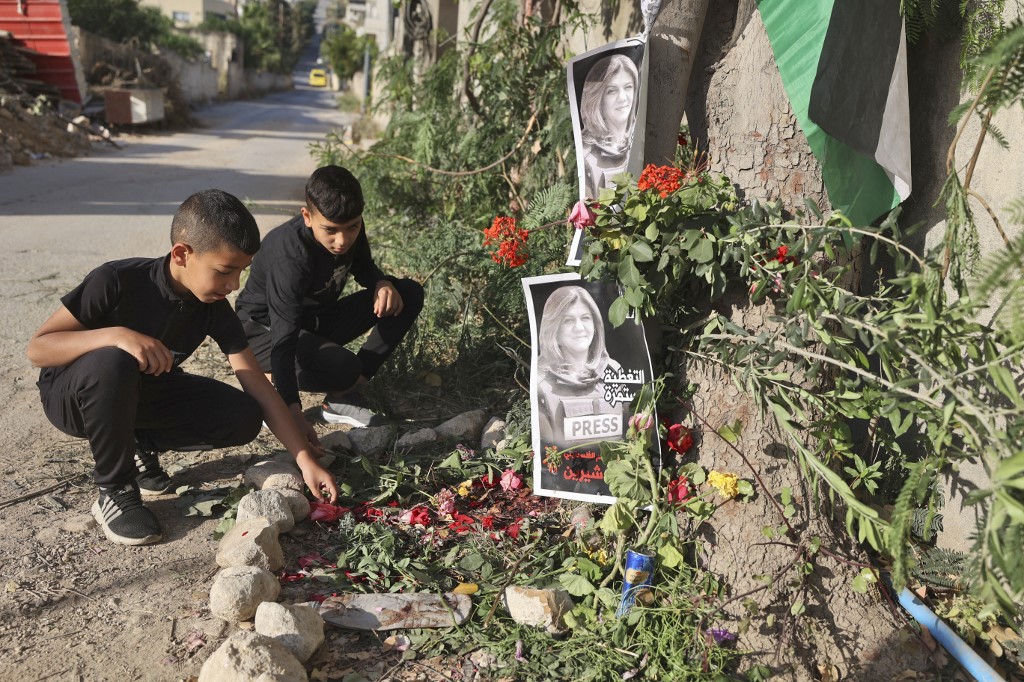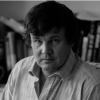To honour the Al Jazeera correspondent's legacy, we must identify those responsible and insist that they be held to account
Peter Oborne
1 July 2022

Family and friends of slain Palestinian journalist Shireen Abu Akleh hold a vigil in Bethlehem on 16 May 2022 (AFP)
There’s a journalists’ altar at St Bride’s Church, the Christopher Wren architectural masterpiece a few yards south of London’s Fleet Street.
On this sacred spot, the best and the bravest among us are remembered. Those who gave their lives, to tell the truth about corruption, injustice, and oppression. The ones who must never be forgotten.
Anna Politkovskaya refused to give up her reporting on the Second Chechen War despite death threats and was fatally shot. Daphne Caruana Galizia, the Maltese investigative reporter assassinated in 2017, is also remembered there, as is Lyra Catherine McKee, shot dead while reporting on a riot in Derry.
If western journalists don't seek justice for Abu Akleh, we are complicit in her killing
Jamal Khashoggi, barbarously sliced up by Saudi Crown Prince Mohammed bin Salman's goons in the Saudi Arabian consulate in Istanbul, has his place on the altar of heroic sacrifice, as does Marie Colvin, killed by Syrian President Bashar al-Assad’s army in Homs.
This week, a new name joined the list of martyrs who have made the supreme sacrifice and given their lives, to tell the truth: Shireen Abu Akleh, in all likelihood shot by an Israeli sniper in Jenin in the northern West Bank on 11 May. Her funeral two days later was grotesquely disrupted when Israeli police attacked mourners in occupied East Jerusalem.
This desecration shaped the service at St Bride’s. Journalist Penelope Quinton, who organised the service, told me: “Not only did they take away her life, they took away her dignity as she was laid to rest. The principle that her funeral should be allowed to pass with dignity was violated.”
'She was a mother to me'
Events at the funeral explained why Quinton chose to include in the service Edward Elgar’s famous anthem: “They are at rest; we may not stir the heaven of their repose by rude invoking voice".
The choir also sang John Tavener’s Song for Athene as a tribute to the indomitable spirit of Abu Akleh. Athene is the Greek goddess of war and intellect, the two intermingled spheres in which Abu Akleh spent her life.
The St Bride’s memorial was filled with song, biblical readings, superlative choral verses, and profoundly moving addresses from some of those who knew Abu Akleh best and loved her deeply.
Ali al-Samoudi, the Al Jazeera journalist who was with Abu Akleh when she was killed and only recently came out of hospital after being badly injured in the same incident, spoke in Arabic via video link. He marvelled at Abu Akleh’s deep religious faith: “She took her rosary everywhere and always gave money to those in need."

Children visit the site where Abu Akleh was shot dead in Jenin on 12 May 2022 (AFP)
Samoudi, a veteran correspondent, did not tell his audience that - by an astonishing coincidence - two decades ago, he himself was reportedly blown into the air by an Israeli tank shell in exactly the same place that Abu Akleh was killed. He miraculously survived.
Najwan Simri, another Al Jazeera colleague, spoke in Arabic of the irreparable personal loss she felt upon Abu Akleh’s death: “She was a mother to me. She was a sister to me.”
The great British Palestinian singer Reem Kelani brought tears to the eyes of many in the congregation with a breathtaking rendition of The Singer Said, which features lyrics by Palestinian poet Mahmoud Darwish.
Some of the words could have been written specifically to describe Abu Akleh’s final moments on earth: “This is how I died / standing, standing / I died like the trees.”
Minute of silence
But we were not there only to mourn and honour Abu Akleh. The congregation stood for a minute of silence to remember the names of all those who have died covering the Israel-Palestine conflict.
Among them were Yusef Abu Hussein, killed in an Israeli air raid last year; Yasser Murtaza, shot dead while covering the 2018 Gaza protests; and so on, and so on.
Among the congregation were journalist Duncan Campbell and his wife, the great actress Julie Christie, and four MPs: former Labour leader Jeremy Corbyn, John McDonnell, Tommy Sheppard, and Claudia Webbe. Quinton told me that she had invited many Tory MPs, but I could see none among the congregation. She said she had invited Foreign Secretary Liz Truss, but did not receive a response; she also invited many members of the Labour front bench, but none were at the service.
Samoudi, a veteran correspondent, did not tell his audience that - by an astonishing coincidence - two decades ago, he himself was reportedly blown into the air by an Israeli tank shell in exactly the same place that Abu Akleh was killed. He miraculously survived.
Najwan Simri, another Al Jazeera colleague, spoke in Arabic of the irreparable personal loss she felt upon Abu Akleh’s death: “She was a mother to me. She was a sister to me.”
The great British Palestinian singer Reem Kelani brought tears to the eyes of many in the congregation with a breathtaking rendition of The Singer Said, which features lyrics by Palestinian poet Mahmoud Darwish.
Some of the words could have been written specifically to describe Abu Akleh’s final moments on earth: “This is how I died / standing, standing / I died like the trees.”
Minute of silence
But we were not there only to mourn and honour Abu Akleh. The congregation stood for a minute of silence to remember the names of all those who have died covering the Israel-Palestine conflict.
Among them were Yusef Abu Hussein, killed in an Israeli air raid last year; Yasser Murtaza, shot dead while covering the 2018 Gaza protests; and so on, and so on.
Among the congregation were journalist Duncan Campbell and his wife, the great actress Julie Christie, and four MPs: former Labour leader Jeremy Corbyn, John McDonnell, Tommy Sheppard, and Claudia Webbe. Quinton told me that she had invited many Tory MPs, but I could see none among the congregation. She said she had invited Foreign Secretary Liz Truss, but did not receive a response; she also invited many members of the Labour front bench, but none were at the service.
Read More »
On the media front, none of the BBC, Sky News, the New York Times, the AP, or AFP had an official presence at the service. Don Macintyre, a veteran political journalist who served as Jerusalem correspondent for the Independent, was among the congregation.
After the service, I spoke with Nadia Nasser Najjab, Abu Akleh’s close friend from the days when they both taught at Birzeit University (Abu Akleh taught English literature before her move into journalism). “I believe that if the case of Shireen is kept alive,” Najjab said, “the case of other Palestinians killed will also be kept alive."
Speaking for the family, Abu Akleh’s niece, Lina, noted that: “Shireen always was a hopeful person and believed that there will be justice for Palestine.”
Lessons learned
I believe there are lessons we journalists must take from Abu Akleh’s magnificent career: report the facts accurately, truthfully, and never give up. Don’t walk on eggshells. Spit it out. Never use the passive tense. Remember how many news outlets reported that Abu Akleh “died” in “clashes”?
She didn’t die. She was killed. To honour her legacy, we need to stick with this story, identify who killed her and who gave the orders, and then insist that they be held to account.
Shireen Abu Akleh was an American citizen and well-known reporter working for a celebrated international news organisation. If we don’t get justice for her, there will never be justice for any Palestinian journalist - or any Palestinian.
One final reflection: if western journalists don’t seek justice for Abu Akleh, we are complicit in her killing.
The views expressed in this article belong to the author and do not necessarily reflect the editorial policy of Middle East Eye.
On the media front, none of the BBC, Sky News, the New York Times, the AP, or AFP had an official presence at the service. Don Macintyre, a veteran political journalist who served as Jerusalem correspondent for the Independent, was among the congregation.
After the service, I spoke with Nadia Nasser Najjab, Abu Akleh’s close friend from the days when they both taught at Birzeit University (Abu Akleh taught English literature before her move into journalism). “I believe that if the case of Shireen is kept alive,” Najjab said, “the case of other Palestinians killed will also be kept alive."
Speaking for the family, Abu Akleh’s niece, Lina, noted that: “Shireen always was a hopeful person and believed that there will be justice for Palestine.”
Lessons learned
I believe there are lessons we journalists must take from Abu Akleh’s magnificent career: report the facts accurately, truthfully, and never give up. Don’t walk on eggshells. Spit it out. Never use the passive tense. Remember how many news outlets reported that Abu Akleh “died” in “clashes”?
She didn’t die. She was killed. To honour her legacy, we need to stick with this story, identify who killed her and who gave the orders, and then insist that they be held to account.
Shireen Abu Akleh was an American citizen and well-known reporter working for a celebrated international news organisation. If we don’t get justice for her, there will never be justice for any Palestinian journalist - or any Palestinian.
One final reflection: if western journalists don’t seek justice for Abu Akleh, we are complicit in her killing.
The views expressed in this article belong to the author and do not necessarily reflect the editorial policy of Middle East Eye.

Peter Oborne won best commentary/blogging in both 2022 and 2017, and was also named freelancer of the year in 2016 at the Drum Online Media Awards for articles he wrote for Middle East Eye. He was also named as British Press Awards Columnist of the Year in 2013. He resigned as chief political columnist of the Daily Telegraph in 2015. His latest book, The Assault on Truth: Boris Johnson, Donald Trump and the Emergence of a New Moral Barbarism, was published in February 2021 and was a Sunday Times Top Ten Bestseller. His previous books include The Triumph of the Political Class, The Rise of Political Lying, and Why the West is Wrong about Nuclear Iran.
SEE

No comments:
Post a Comment